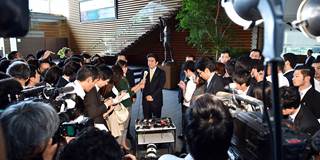Outright disinformation that spreads widely, often through social media or other online platforms, has received much attention in recent years. But biased news, in which strategic edits surreptitiously advance the views of a journalist, editor, or broadcaster, is a far more powerful tool for turning people against their leaders – and one another.
TOKYO – Interviews are always tricky. If an unscrupulous interviewer is looking for a particular answer or claim, they have the power to edit, manipulate, or even rewrite their subject’s words to that end. That is why I have long taken pains to check carefully quotations attributed to me by the media. But, when it comes to television or radio interviews, it seemed to me that such distortions would be more difficult to pull off. I was wrong.

TOKYO – Interviews are always tricky. If an unscrupulous interviewer is looking for a particular answer or claim, they have the power to edit, manipulate, or even rewrite their subject’s words to that end. That is why I have long taken pains to check carefully quotations attributed to me by the media. But, when it comes to television or radio interviews, it seemed to me that such distortions would be more difficult to pull off. I was wrong.